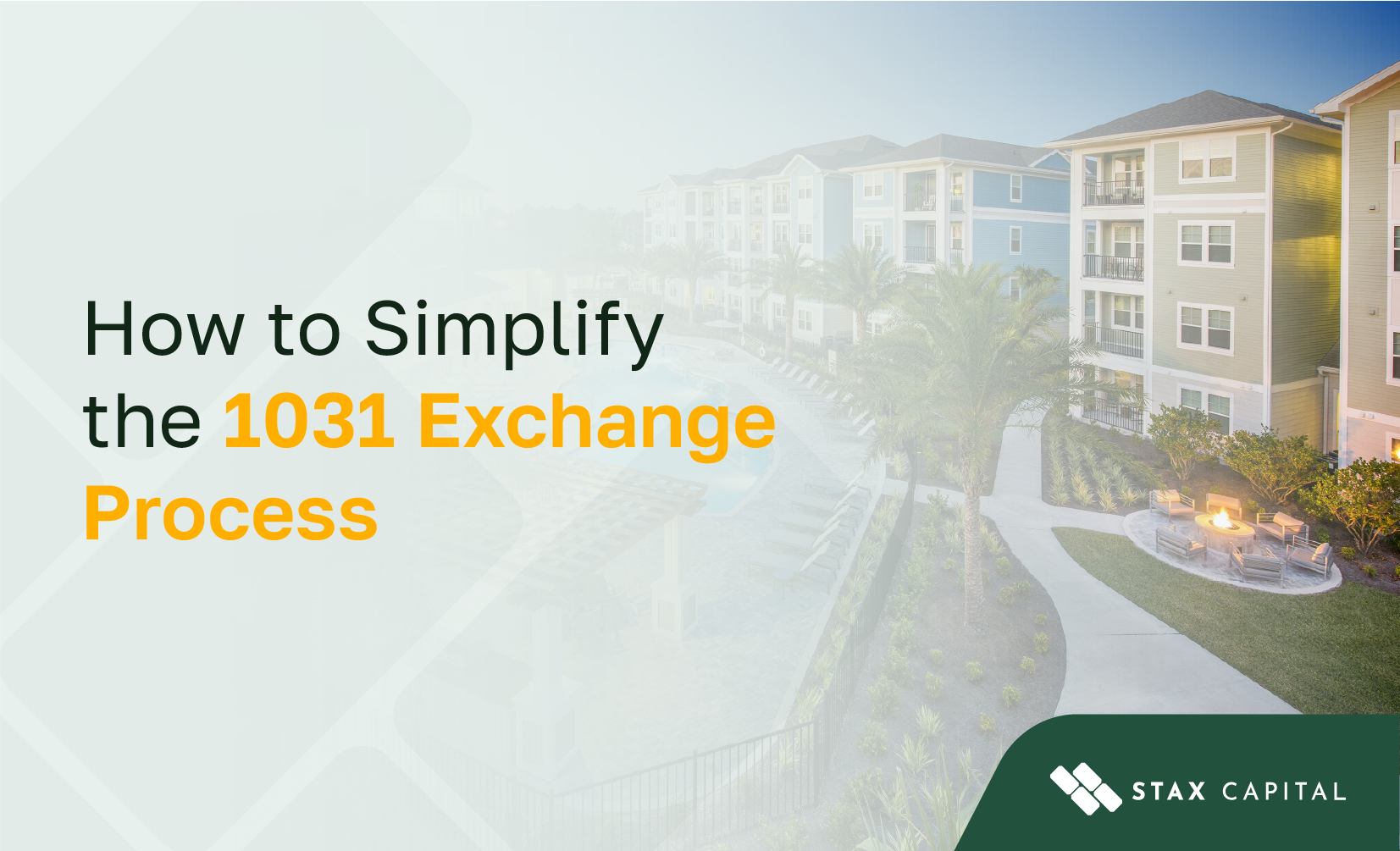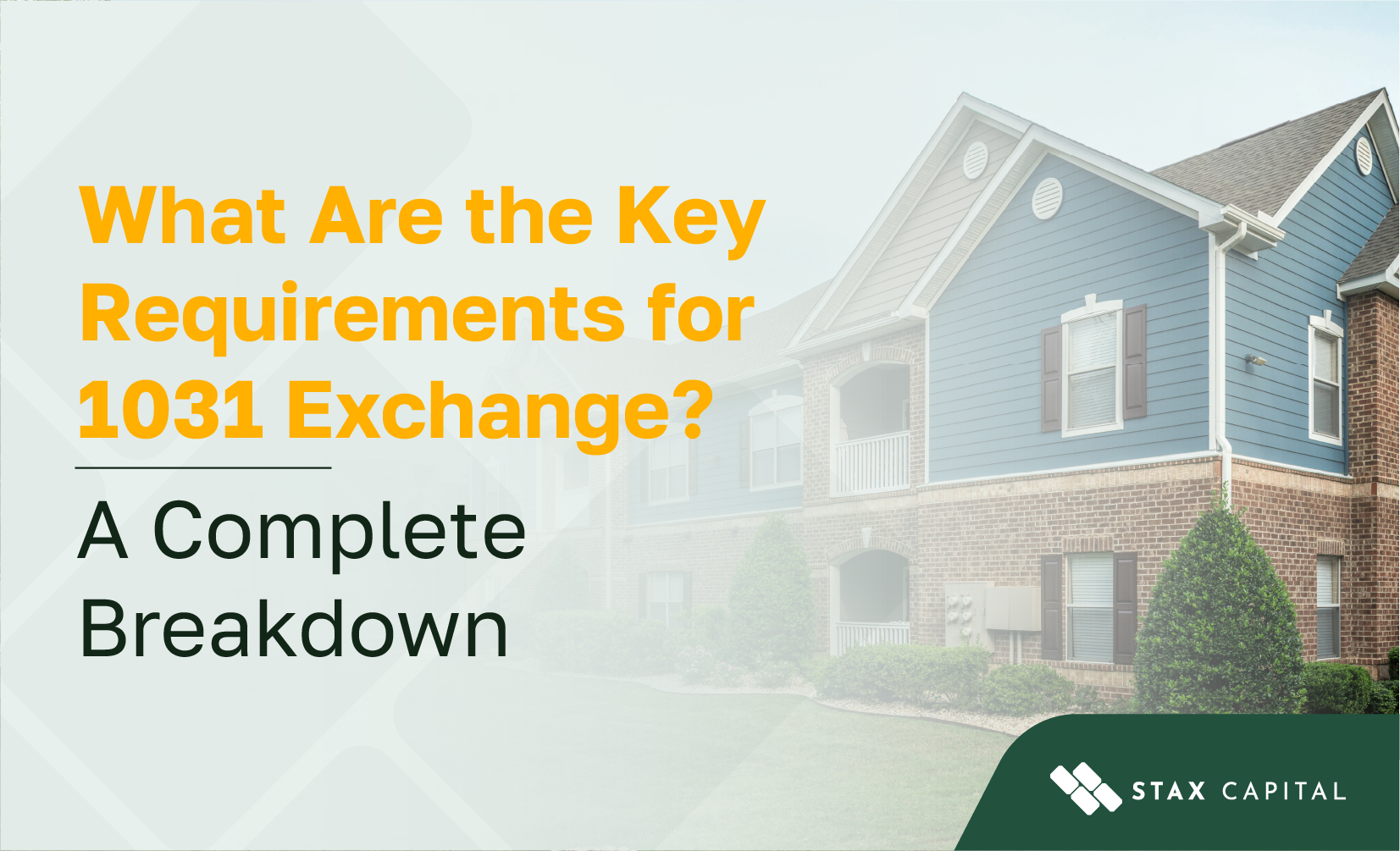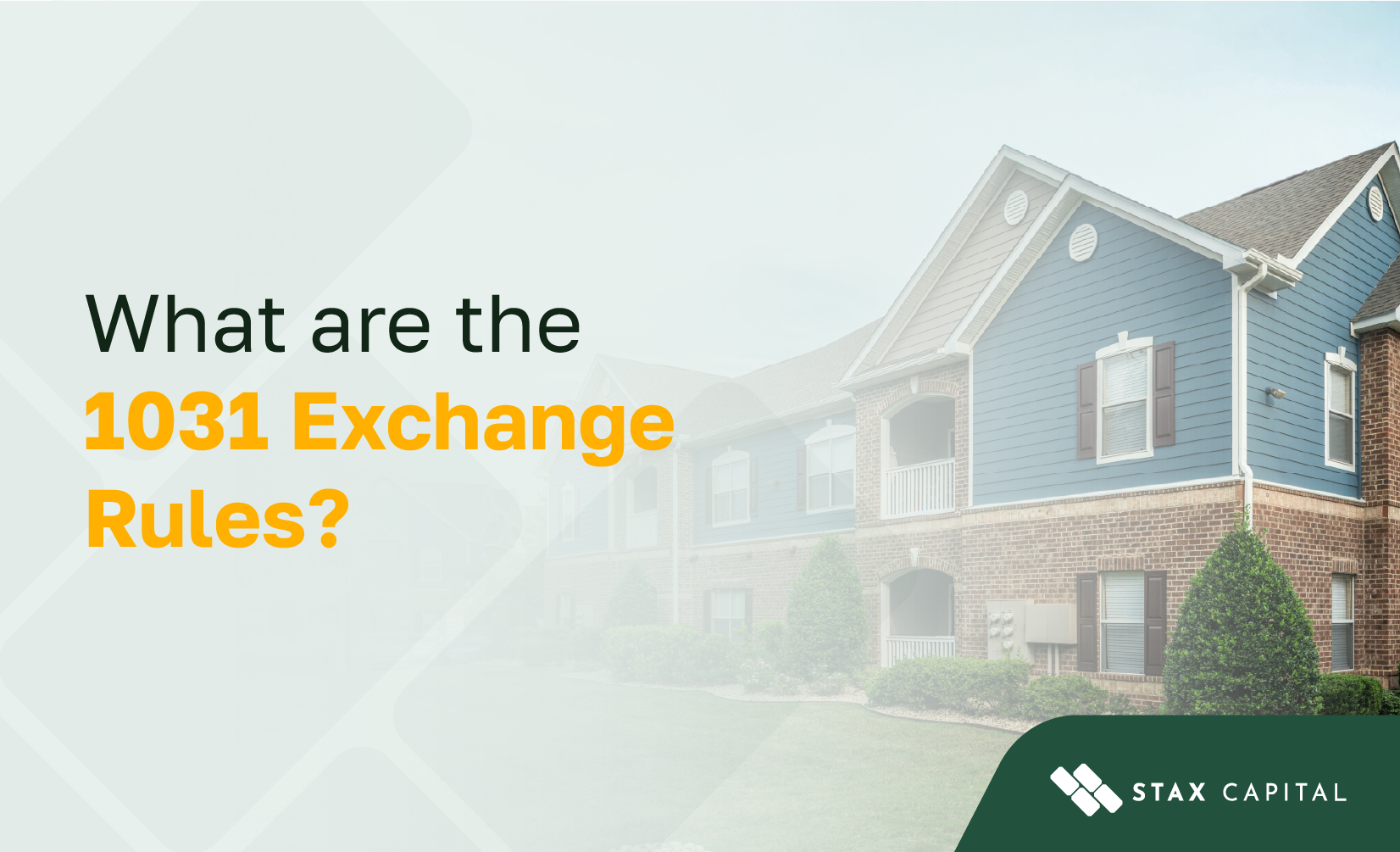Frequently Asked Questions: 1031 Exchanges

Real estate investors often have questions about the 1031 exchange process and how they can partake of any potential tax benefits associated with it. The answers to a few of the frequently asked questions on 1031 exchanges can be found below.
What is the 1031 like-kind exchange?
The 1031 Exchange is a tax advantage process that enables investors to defer taxes on capital gains from the sale of a disposed property if the sale proceeds are reinvested into another property that is like-kind in nature. This exchange originated from the Internal Revenue Code (IRC), section 1031, which refers to the exchange of property held for productive use or investment.
When an investor eventually sells the reinvestment property, the deferred capital gain from the disposed property plus any additional gain from the replacement property would be subject to tax.
Is the 1031 exchange process easy or complicated?
The 1031 exchange process may seem daunting but with the right investment partners and financial advisors as well as tax experts, reinvesting your proceeds from a property sale into a like-kind property to qualify as a 1031 exchange can be straightforward. Taking advantage of possible tax benefits associated with the 1031 exchange involves key rules that must be met, for this reason, most people consider it to be a complex process.
What are the 1031 exchange rules?
There are rules that have to be followed for a sale and purchase transaction to qualify as a 1031 exchange. These rules are centered around:
Timing:
When you sell a property and have handed over the proceeds to a 1031 exchange facilitator, you would need to identify a reinvestment property within 45 days from the sale or transfer of the existing property. Additionally, the replacement property would need to be received within 180 days from the sale and transfer of the relinquished property or by the date the investor’s tax return for the taxable year is due.
Third-party facilitator:
A third party, usually a qualified intermediary is needed to facilitate a 1031 exchange. The sales proceeds are usually put in an escrow account managed by the facilitator who is also responsible to transfer this money to the seller of the reinvestment property.
Like-Kind Property:
For an exchange to be considered a 1031 exchange, the properties sold and purchased should be like-kind. If this requirement is not met, you may not qualify for any tax deferral benefit. This does not translate to the properties being the same in terms of quality or grade but rather in terms of nature and character.
Value of Property:
The value of the replacement property should be of equal or greater value than that of the relinquished property for the transaction to qualify for tax deferral. Proceeds that are not considered to be like-kind property exchange would be subject to tax.
What does not qualify as a 1031 investment property?
Generally, most commercial, retail and even residential properties that are used for business and investment purposes qualify as 1031 replacement property. Primary residences generally do not qualify for 1031 investment property, however, there may be some exceptions. Also properties that are held with the intention to sell such as fixer-upper properties or moving business inventory generally are not eligible for like-kind exchanges. You may be able to exchange multiple properties and qualify for tax deferral, provided the reinvested property or properties have a higher value than the properties sold.
Other types of properties not considered as eligible for 1031 exchanges include stocks, bonds and securities. An important part to take note of is that foreign properties do not qualify for like-kind transactions. All properties exchanged should be located in the United States.
What are the potential bottlenecks in a 1031 exchange?
The common setbacks that can be faced with a 1031 exchange are:
1. Identifying qualifying like-kind property within 45 after the sale or transfer of an existing property.
2. A delay in getting all the required documents and buy-ins needed to close and finalize the 1031 exchange within the 180-day window.
3. Getting a qualified and trustworthy intermediary to manage the sale proceeds and facilitate the reinvestment of property purchase.
4. Possibilities of the exchange resulting in a boot. This usually occurs when the value of the replacement property is deemed lower than the value of the sold property or other payments in kind that do not qualify for 1031 exchanges. This may result in gains that can be taxed.
There may be other setbacks involved, but these may be prevented if you work with experts and well-experienced subject matters to execute the required transactions.
What are the different types of 1031 exchange?
The various forms through which a 1031 exchange process can be executed include:
Delayed Exchange:
This type of exchange is most commonly used amongst real estate investors. It usually involves selling off existing property first before identifying a replacement property within the 45-day window and closing on the exchange process in 180 days from when the relinquished property was disposed of. This may be the most preferred option if you are having a difficult time locating a property that qualifies for 1031 exchange. However, these delayed exchanges stand the risk of failing to meet the timing deadlines.
Reversed Exchange:
Unlike the delayed exchange, the reversed exchange would generally involve an investor identifying and purchasing a replacement property before the relinquished property is sold. The timing rules would usually also apply for this type of exchange such that the relinquished property has to be identified and sold in a timely manner in compliance to the 45 days and 180 days requirements respectively. This method for 1031 exchanges is usually suitable for investors with available cash to purchase the new property before selling off the existing property.
Simultaneous Exchange:
Sometimes, investors already have all that is needed for the 1031 exchange process and so they opt to simultaneously sell off the existing property and purchase the replacement property simultaneously through the services of the facilitator. This is usually a same day transaction hence the derived name, a simultaneous exchange.
Improvement Exchange:
In this type of exchange, an investor usually identifies a replacement property that requires some construction or improvement. The same timing rules apply to this type of exchange and in addition, after the improvements, the value of the replacement property should not be lower than the disposed property as this may result in taxable income.
Which costs are associated with a 1031 exchange?
An average 1031 exchange process would incur costs for professional and subject matter experts such as financial advisors, lawyers, tax experts, qualified intermediaries, etc.
These costs can include document fees, property taxes, insurance fees, inspection fees, transfer and escrow fees, etc. You should also expect to pay investment fees to alternative investment providers who provide access to qualifying properties for 1013 exchanges.
How do you find a qualified intermediary?
A qualified intermediary or facilitator is required to facilitate the 1031 exchange process. Without a third party intermediary holding and transferring the sale proceeds and property, the process may not qualify for 1031 exchanges and capital income may be subject to tax.
In order to find a qualified intermediary, you need to carry out adequate research to ensure that the qualified intermediary is professional, trustworthy, competent, and reliable to facilitate your exchange process. Most investment companies have existing networks of qualified intermediaries that can successfully facilitate the 1031 like-kind exchange. However, the facilitator can not be one who has acted or is acting in the capacity of an agent to the investor, such as a lawyer, financial advisor, or tax expert.
Can I find a replacement property before I sell my property?
Yes, generally, you should be able to complete a 1031 exchange if you find a replacement property before you sell your existing property. As in the reversed 1031 exchange method, you may be able to not only identity but also purchase the new property before the relinquished property is sold. Most times, investors utilize a conditional clause for the property purchase to be contingent on the sale of the relinquished property.
Do I need to hire a tax expert before I do a 1031 exchange?
While there is no compulsory law indicating that you must hire a tax expert for a 1031 exchange process, it is recommended to employ the services of a tax expert that can provide financial and tax implications of your investments both in the short run and long run. Likewise, you may need to contact a financial advisor to help analyse how your investment may fit into your ultimate financial strategy.
Would I need to reinvest all my sale proceeds or just the capital gains?
To qualify as a 1031 exchange, the entire proceeds from the relinquished property sale has to be reinvested into the new replacement property and not only the capital gains. This should not be confused with the rules guiding a qualified opportunity fund investment that requires a reinvestment of only the capital gains.
Can I cancel a 1031 exchange process?
You may be able to cancel a 1031 exchange. However, the ease of doing this would depend on the timing and progress of the exchange. The proceeds from a property sale should be in the custody of a facilitator in an escrow account. As an investor, if you have actual or constructive receipt of the proceeds, the eligibility of the transaction being a 1031 exchange would be in question. It is advisable to seek clarifications from your facilitator, lawyer, tax experts, and investment partners before you begin the exchange process or at any point when you are considering a cancellation.



Share: